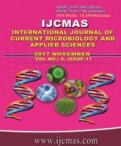


 National Academy of Agricultural Sciences (NAAS)
National Academy of Agricultural Sciences (NAAS)

|
PRINT ISSN : 2319-7692
Online ISSN : 2319-7706 Issues : 12 per year Publisher : Excellent Publishers Email : editorijcmas@gmail.com / submit@ijcmas.com Editor-in-chief: Dr.M.Prakash Index Copernicus ICV 2018: 95.39 NAAS RATING 2020: 5.38 |
Heat stress is one of the most challenging environmental conditions affecting commercial poultry. Compared to other species of domestic animals, broiler chickens are more sensitive to high ambient temperatures. They have no sweat glands, a rapid metabolism and high body temperature. Supplementation of ascorbic acid (vitamin C) has been found to improve feed intake, body weight gain, feed efficiency, nutrient digestibility, immune response and antioxidant status in poultry. The present work was conducted to investigate the effect of ascorbic acid on biochemical parameters during heat stress in commercial broilers. A total number of 96 birds were randomly divided into 4 groups and each group consists of 12 birds in two replicates. Work was done in two conditions, heat and comfort. Heat stressed groups were maintained at 37±5.0°C whereas Comfort groups were maintained at 26±1.0°C. G1 was taken as control whereas G2, G3 and G4 were supplemented with 100 mg, 200 mg and 300 mg of vitamin C respectively. The maximum response of vitamin C was found in G3 group maintained at 37±5.0°C supplemented with 200 mg vitamin C followed by G4, G2 group supplemented with 300 mg, 100 mg vitamin C in feed as compared to G1 i.e. control group.
 |
 |
 |
 |
 |